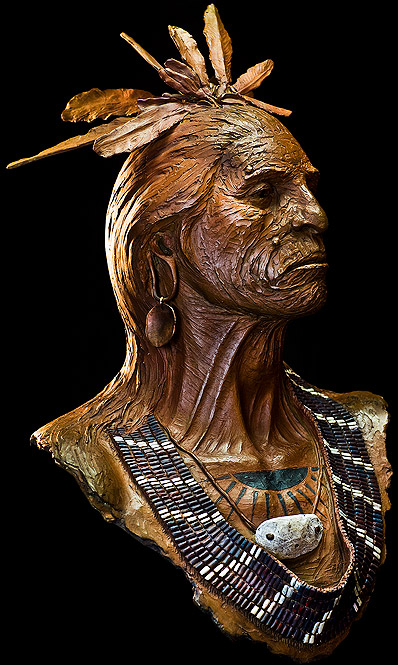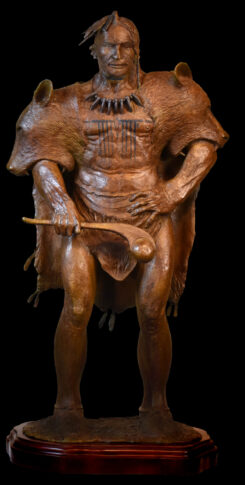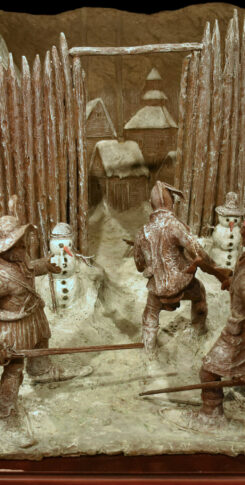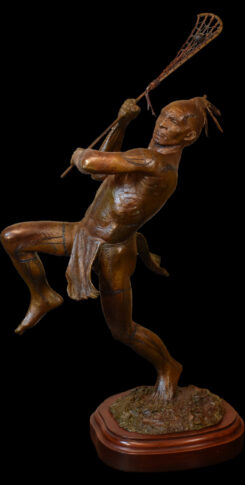Bronze edition: 25 | Height: 30″
In the early 1630’s Sassacus “held dominion over part of Long Island, over the Mohegan, over the sagamores of Quinapeake (New Haven), yea over all the people that dwelt upon Connecticut River, and over some of the southerly inhabitants of the Nipmuck Country about Quinabaug.” (Shelburne/Brookfield, Mass.)
Daniel Gookin c.1656
The noted and last chief of the powerful Pequot tribe. His name apparently translates to “he is wild, (untamed), fierce.” The domain of the Pequots extended from Narragansett Bay toward the Hudson River including much of Long Island. It is said that no fewer than 26 sachems were subordinate to him. Remembered as “a renowned warrior and noble and high spirited man.
” ‘Tis admirable to consider how powerful are their kings and yet how they move by the breath of their people. I have never seen more natural sagacity and he will deserve the name wise who is able to outwit them…they are tall and straight, tread strong and clever and walk with a lofty chin.”
William Penn, 1681
“This part of New England, nourished many natives, distinguished into diverse petty nations and factions…their outsides say they are men, their actions say they are reasonable. As the thing is, so it operateth. They are of a person straight and tall, of limbs big and strong, seldom violent or extreme in passion (stoic)…armed they are with bows and arrows, clubs and javelins, etc. In the southern most part are the Pequots a stately warlike people which have been terrible to their neighbors and troublesome to the English.”
Phillip Vincent’s Relation, 1638
“The Pequots are the most numerous, the most warlike, the fiercest and the bravest of all the aboriginal clans of Connecticut…Sassacus, their last grand sachem had 26 sagamores under him..The Pequots now (c1600) found themselves in possession of a large extent of country… and they maintained their hold on their conquered territory with a tenacity equal to the boldness with which they had seized it.”
“History of the Indians of Connecticut” De Forest, 1851
Their downfall came suddenly in 1637 when a united force of Conn. And Mass. militia and Narragansetts and Mohegans attacked one of two Pequot towns at Mystic (Sassacus and most of the warriors being in the other town.). The justification for the attack was highly questionable and the motivation transparently self-serving. Setting fire to the wigwams, they destroyed all indiscriminately, with casualties estimated between 400-700 and all accounts agreeing that very few escaped. After the slaughter “on the next day a Council of the Nation was held at which three plans of action were proposed and discussed. Sassacus, whose spirit was still unbroken, urgently supported the braver alternative; but the great body of the nation, overwhelmed by the extent and fearful nature of the calamity were resolved upon flight.”
“History of the Indians of Conn.” De Forest, 1851
“Most courageously these Pequots behaved themselves. The fires blazed most terribly and burnt all in the space of half an hour. Many courageous fellows were unwilling to come out and fought most desperately through the palisades so as they were scorched and burnt with the very flame, and were deprived of their arms, in regard the fire burnt their very bowstrings, and so perished valiantly. Mercy did they deserve for their valor could we have had opportunity to have bestowed it…down fell men, women and children…it may be demanded why should you be so furious? Should not Christians have more mercy and compassion?…but we will not dispute it now. We had sufficient light from the word of God for our proceedings.”
Underhill’s Narrative, 1638
“Blessed be the Lord God of Israel and blessed be His Holy Name forever…thus the Lord was pleased to smite our enemies…and give to us their land as an inheritance…let us therefore praise the Lord for his goodness.”
“A Brief History of the Pequot War” Major John Mason, 1637
“In a special manner, the wonderful victory obtained…over a bold and bloody tribe…and their sudden destruction that memorable day, was the singular work of God.”
Benjamin Colman, 1726
“Men never do evil so completely or so cheerfully as when they do it from religious conviction.”
Blaise Pascal, c. 1650
In response to Rev. Thomas Mayhew’s request: “Tell your missionaries to go and preach among the English until they are good.”
Ninigret, Narragansett Sachen, c. 1646
“Missionaries go forth to Christianize the savages, as if they weren’t dangerous enough already.”
Edward Abbey (1927-1989)





